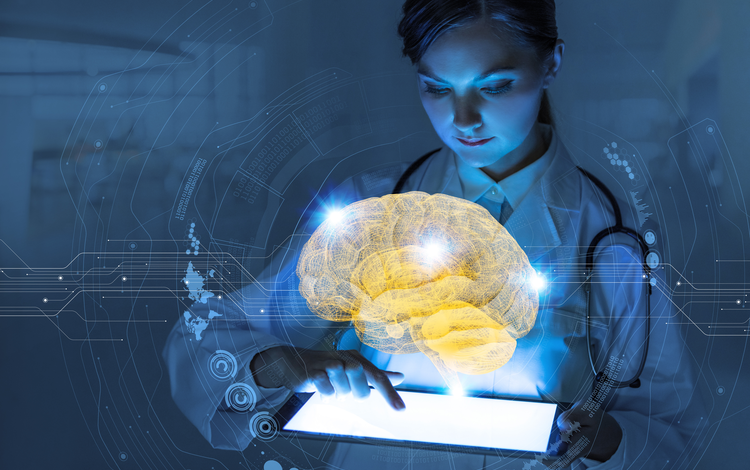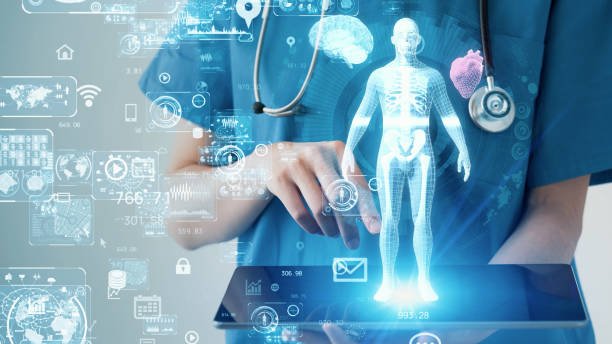Artificial intelligence’s Effects on Healthcare In 2023

Artificial intelligence’s Effects on Healthcare? In the fast-evolving landscape of healthcare, one of the most remarkable transformations we’re witnessing in 2023 is the integration of Artificial Intelligence (AI). The synergies between AI and healthcare have given rise to a host of innovations that promise to reshape the industry for the better. In this comprehensive article, we delve into the profound effects of Artificial Intelligence on Healthcare in 2023, examining its far-reaching implications under various facets.
Enhanced Diagnostic Accuracy
AI-driven diagnostic tools are proving to be game-changers. Through machine learning and data analysis, these tools can quickly and accurately identify diseases, often with higher precision than human doctors. From early cancer detection to pinpointing rare genetic disorders, AI is at the forefront of revolutionizing diagnostics.
Personalized Treatment Plans
The advent of AI has ushered in an era of personalized medicine. By analyzing a patient’s genetic makeup and medical history, AI can tailor treatment plans that are not only more effective but also minimize side effects. This personalized approach is changing the way we treat diseases, making healthcare more patient-centric.
Streamlined Administrative Tasks

Healthcare providers are benefiting from AI’s ability to handle administrative tasks efficiently. Appointment scheduling, medical billing, and insurance claims processing are now automated, reducing administrative burdens and allowing healthcare professionals to focus more on patient care.
Predictive Healthcare Analytics
AI’s predictive capabilities are instrumental in preventing diseases and optimizing healthcare resources. Machine learning algorithms analyze vast amounts of data to identify trends and predict disease outbreaks. This proactive approach is invaluable in preventing epidemics and ensuring timely interventions.
Drug Discovery and Development
The pharmaceutical industry is experiencing a renaissance in drug discovery, thanks to AI. By simulating the interactions between molecules and predicting their efficacy, AI expedites drug development, potentially bringing life-saving treatments to market faster.
Telemedicine Revolution

Telemedicine has surged in popularity, especially in remote or underserved areas. AI-powered virtual healthcare platforms offer patients quick access to medical advice and diagnoses, reducing the need for physical hospital visits.
Healthcare Robotics
In 2023, healthcare robots are becoming a common sight in hospitals and clinics. These robots assist with tasks such as medication delivery, patient monitoring, and even surgeries, augmenting the capabilities of healthcare professionals.
Ethical Considerations
As AI plays an increasingly central role in healthcare, ethical questions arise. Issues like data privacy, algorithm bias, and the potential for job displacement must be carefully addressed to ensure AI’s benefits are maximized while minimizing harm.
Cost Savings
Efficiency gains through AI not only improve patient care but also reduce the overall cost of healthcare delivery. This cost-effectiveness is critical in ensuring healthcare accessibility and sustainability.
Improved Patient Engagement

AI-driven chatbots and virtual assistants are enhancing patient engagement. Patients can receive real-time information, medication reminders, and answers to their healthcare queries, empowering them to take a more active role in their well-being.
Education and Training
AI-powered simulations and virtual reality are revolutionizing medical education and training. Healthcare professionals can now practice complex procedures in a risk-free environment, improving their skills and patient outcomes.
The Human-AI Partnership
AI is not here to replace healthcare professionals but to augment their capabilities. The human-AI partnership is fostering a new era of collaborative healthcare, where technology empowers doctors, nurses, and caregivers.
Regulatory Framework
The integration of AI into healthcare necessitates robust regulatory frameworks to ensure patient safety and data security. Governments and organizations are working to establish guidelines that govern AI’s use in healthcare.
Read More: Top 10 Healthcare Innovation Hubs and Startups In 2023
Accessibility and Equity
AI has the potential to bridge healthcare gaps by providing access to quality healthcare in remote areas and underserved communities. Ensuring equitable distribution and affordability of AI-driven healthcare solutions is a priority in 2023.
Mental Health Support
AI-powered mental health apps and chatbots are providing valuable support for individuals dealing with mental health issues. These tools offer round-the-clock assistance and resources, reducing the stigma surrounding mental health.
Cybersecurity Challenges
The increased reliance on AI in healthcare also raises concerns about cybersecurity. Protecting patient data from cyberattacks is of utmost importance in maintaining trust and confidentiality.
Global Collaboration
Collaboration among countries and organizations is essential for harnessing the full potential of AI in healthcare. Sharing knowledge, best practices, and research findings can accelerate progress in this field.
AI and Elderly Care
AI is transforming elderly care by providing companionship, monitoring health, and ensuring timely interventions in case of emergencies. This technology is helping seniors maintain their independence and quality of life.
Emergency Response
AI-powered emergency response systems can detect accidents or medical emergencies and dispatch help swiftly, potentially saving lives in critical situations.
Rehabilitation and Physical Therapy
AI-driven rehabilitation and physical therapy programs are customizing treatment plans for patients recovering from injuries or surgeries, improving recovery outcomes.
Data Security and Privacy
The secure handling of patient data is paramount. AI is being used to develop advanced encryption and authentication methods to protect sensitive medical information.
Future Outlook
The journey of AI in healthcare has just begun. As technology continues to evolve, we can expect even more innovative solutions and breakthroughs in patient care, disease prevention, and healthcare accessibility.
Conclusion
In 2023, Artificial Intelligence’s Effects on Healthcare are nothing short of transformative. From enhanced diagnostics to personalized treatment plans and streamlined administrative tasks, AI is revolutionizing every aspect of the healthcare industry. While challenges such as ethics and data security must be addressed, the promise of AI in healthcare is undeniable. As we look ahead, the partnership between humans and AI holds the potential to usher in an era of healthcare that is more efficient, accessible, and patient-centric.
FAQs : Artificial intelligence’s Effects on Healthcare
How is AI enhancing patient care in 2023?
AI is enhancing patient care through improved diagnostics, personalized treatment plans, and streamlined administrative tasks, among other benefits.
Are there any ethical concerns associated with AI in healthcare?
Yes, ethical concerns include data privacy, algorithm bias, and potential job displacement. These issues need careful consideration.
What is the role of AI in drug discovery?
AI expedites drug discovery by simulating molecule interactions, accelerating the development of new medications.
How is AI improving mental healthcare?
AI-powered apps and chatbots provide round-the-clock support and resources for individuals dealing with mental health issues.
How can AI benefit elderly care?
AI assists in elderly care by providing companionship, monitoring health, and ensuring timely interventions in emergencies.
What is the future of AI in healthcare?
The future holds even more innovation in patient care, disease prevention, and healthcare accessibility as AI technology continues to evolve.











